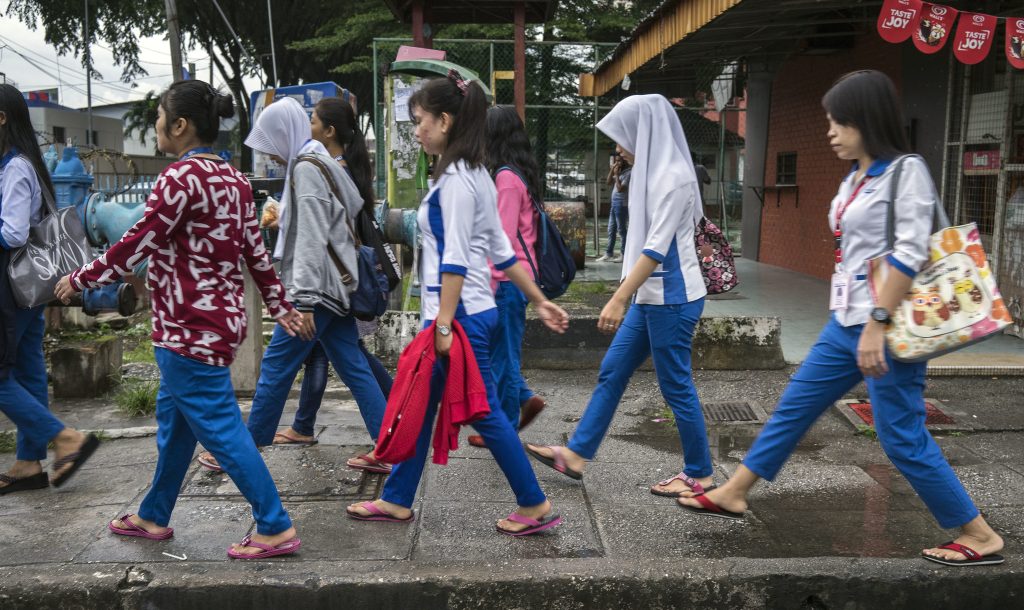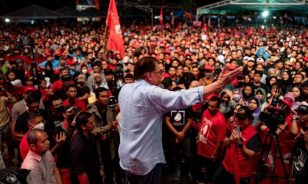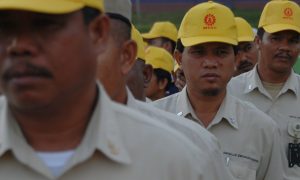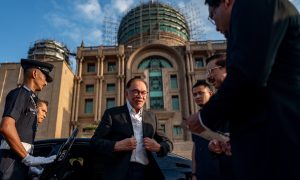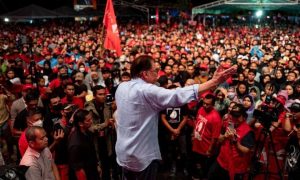In being appointed Malaysia’s 10th prime minister in November 2022, Anwar Ibrahim made history by becoming the country’s first prime minister from a multiracial party. Despite Anwar’s unity government commanding the clear support of a majority of parliamentarians, including those of UMNO, the opposition Malaysian Islamic party (PAS) has continuously attacked Anwar for lacking Malay–Muslim support.
Supporters of Anwar’s Pakatan Harapan coalition government have offered two prescriptions for his administration to respond to this attack: either make some compromises to the Bumiputera agenda, or to formulate a “Malaysian” agenda focusing on poverty alleviation and uplift of the socioeconomic ‘bottom 40 [per cent]’, which includes many Malays.
The debate on the Bumiputera versus Malaysian agendas shows how Anwar will have to walk a tightrope in the polarised post-GE15 political environment. Undoubtedly, a policy formulation based on income stratification—typically expressed in terms of the top 20, middle 40 and bottom 40 [per cent]—is a clever way to get through the muck of ethnic politics in Malaysia. It helps policy makers to provide more support to the bottom 40, redistribute wealth across income groups, and ensure social mobility of the poor. In fact, it was widely used by Najib Razak’s government without modifying the sensitive ethnic-based New Economy Policy.
But the discussion of income-based economic uplift as a remedy for racial politics often neglects how labour relations shape the class aspects of Malaysian society. The blind spot is why Malaysian labour, unlike its counterparts in other countries, has failed to become an autonomous social force that facilitates wealth distribution across classes through collective action.
The 12th Malaysia Plan (2021–2025) reported that Malaysia’s labour share of GDP in 2019 was only 35.9%, lagging behind Singapore (40.2%), South Korea (46.8%), the UK (55.5%) and Germany (59.4%). A variety of explanations were given by the government: overreliance on low-skilled workers, wage suppression as a result of the large pool of migrant workers, and that the Malaysian economy is operating at the lower end of the value chain.
The government has long chosen to ignore a profound structural factor. Malaysian workers—particularly unskilled ones, regardless of their ethnicity—have little power to bargain for better distribution of wealth because labour policies stretching back to British colonial rule have engendered enormous asymmetric power between workers and capital owners.
After a period of labour unrest in 1930s, the colonial administration instituted a repressive labour regime. This regime remained largely intact after independence, perpetuating workers’ powerlessness to bargain for higher wages and benefits.
For eight decades, militant trade union leaders were either killed, banished or detained. Trade unions that regularly led strikes were deregistered, and prominent labour activists were the target of detention without trial laws. A tame labour centre was promoted to supplant the more assertive Pan-Malayan Federation of Trade Unions (PMFTU).
The restriction on establishment of trade unions within particular trades and industries (unions in the electrical industry and electronics manufacturing, for instance, must be established separately) and the promotion of firm-based unionism during Mahathir Mohamad’s 22-year administration, tremendously weakened the bargaining power of industrial unions. Malaysia’s anti-labour regime successfully fragmented the labour movement into pieces.
Consequently, when workers were asked by the government to negotiate with employers over wages during extended COVID-19 lockdowns, most workplaces did not have bargaining platforms between workers and employers, because more than 90% of Malaysian workers aren’t unorganised into unions.
The UMNO era is over, but its political economy model and the social conflicts it created still set the terms of the new politics.
Malaysia’s new struggle over state power
It is crucial to recall the Permatang Pauh Declaration pronounced by Anwar after his sacking by the then prime minister Mahathir in 1998. The declaration articulated a vision centred not only on people’s sovereignty and the necessity of justice and democracy in the face of oppression, but also economic justice and fair redistribution of wealth.
The PKR-led Selangor state government, to which Anwar was an economic advisor, has implemented various redistributive agenda under the People-based Economic Programme (Merakyatkan Ekonomi Selangor). Children of estate workers earning below RM1,500 per month are entitled to financial assistance. Households earning below RM10,000 can apply for the Selangor public housing scheme, and households earning below RM3,000 can access healthcare assistance up to RM500 per year. Other programmes such as funeral assistance, children’s educational savings accounts and 20m2 of free water were given to all Selangor residents.
Anwar’s unity government may duplicate the Selangor success—but it won’t be able to empower workers to choose their own destiny and act as a sustainable social force unless it can formulate a labour agenda as part of realising the idea of economic justice. By strengthening workers’ bargaining power relative to capital owners’, such a labour agenda would benefit all Malaysian workers—Malays, Chinese, Indian, Kadazan, Iban, and others—by helping them attain a living wage.
There are eight aspects of the labour agenda that should be considered:
1: Deepen labour law reform to protect freedom of association
Under the previous parliament, Malaysia’s efforts to reform its labour laws reached an advanced stage. Reforms were part of the requirements for Malaysia to join the Comprehensive and Progressive Agreement for Trans-Pacific Partnership (CPTPP). The 2016 US–Malaysia Labour Consistency Plan required Malaysia to amend labour law in adherence to the ILO’s International Labour Standards.
Therefore, the Industrial Relations (Amendment) Bill was passed in the parliament by the Pakatan Harapan government in October 2019. After the collapsed of the Pakatan Harapan government, the Perikatan Nasional government passed the Employment (Amendment) Bill in March 2021, subsequently passed the Trade Union (Amendment) Bill in the lower house of the parliament ahead of GE15.
With the bill now in the hands of the upper house (Dewan Negara), the new government should accomplish this unfinished legislative process and implement these vital reforms as soon as possible. The bill will improve workers’ freedom of association, allow trade unions to organise workers beyond the existing trades and industries they work in, and significantly reduce the discretionary power of the Director-General of Trade Union Affairs located within the Ministry of Human Resources. After the amendment, the Director-General cannot longer refuse registration of trade unions if “he is of the opinion” that a union is likely to be used for unlawful purposes, to be undesirable, or if the second union is not in the interest of the workers.
However, Anwar should take further steps to deepen labour law reform. He could follow the path of the former Indonesian president B.J. Habibie, who decisively ratified International Labour Organization (ILO) Convention 87 on Freedom of Association and Protection of the Right to Organise, putting Indonesia on a path towards the reformed labour laws that provided full freedom of association after the fall of Suharto.
Thanks to the labour law reforms of 1998–2003, today’s Indonesia has a vibrant trade union movement. Indonesian unions have played a crucial role in annual wage increment and improvement of social security system—indeed, the trade union movement has posed a critical challenge to the enactment of the Omnibus Law on Job Creation by President Joko Widodo’s administration. Through demonstrations, national strikes and interventions at the Constitutional Court, the movement has achieved partial success by getting the court to declare the law as conditionally unconstitutional.
The restriction that divides trade unions into workers, executive, managerial, confidential and security capacity in Malaysian Industrial Relations Act should be abolished. Employers in Malaysia often promote union leaders to higher positions, or file judicial reviews to deny executive staff’s ability to lead a union. Both tactics deprive trade unions of effective leadership. All workers, regardless local, migrant or gig workers should be allowed to form and join trade unions of their own choice and be elected as trade union officials.
The Industrial Relations Act and related regulations must be reformed to facilitate collective bargaining, for example by abolishing the Act’s exclusion of public servants from collective bargaining. The pro-employer union recognition procedure has also inhibited collective bargaining. Secret ballots must be held based on the list of eligible names on the voting date, and the vote count in the ballot box. Today only 2% of Malaysian workers are covered by collective agreements, despite Malaysia being a party to ILO Convention 98 on the Right to Organise and Collective Bargaining.
The new government must also take stern action against companies involved in union busting. Errant employers should not only be fined or jailed in accordance with the Industrial Relations Act: once convicted, the employers must be publicly shamed. In November, Taiwan’s government passed a law amendment to protect workers from anti-union discrimination. Employers, once convicted for anti-union discrimination, their personal names, company names, and the offences will be publicly announced. The Malaysian government should follow suit.
2. Include workers’ rights in the Federal Constitution
Pakatan Harapan’s GE15 manifesto promised to amend the Federal Constitution to confer citizenship for any child born in Malaysia to either a Malaysian father or mother. The current constitution that forbids Malaysian mother married to foreign partner passing on citizenship to their children have drawn much criticism from the civil society.
The new government should not take a piecemeal approach in constitutional amendments. It is time for Anwar to revamp the constitution in line with human rights principles, including the fundamental workers’ rights. Workers’ freedom of association, right to collective bargaining, right to strike and right to social security, and the principle of equal pay for equal work, should be enshrined in the Federal Constitution.
3. Incentivise unionisation
Instead of playing a passive role in registering trade unions, the Trade Union Affairs Department (JHEKS) within the Ministry of Human Resources must be given a time-bound target to increase unionisation rates, such as doubling union membership by 2030.
Various policy incentives can be formulated to encourage registration as trade union members. Employers should be entitled to tax deductions if their workplaces are unionised. The government could also imitate Swedish social security policy in allowing trade unions to administer unemployment benefits as a step to promote visibility of trade unions.
Furthermore, taking a hint from other labour movements in the Asian region, the government could provide seed funds for trade unions to launch a strong cooperative movement to improve the economic wellbeing of union members. The government and unions must ensure these cooperatives are managed professionally, being held accountable to members and communities.
4. Facilitate industry-wide bargaining
While the minimum wage is a good policy tool to increase real wages for Malaysian workers, it is sometimes too little, too late and too rigid. Just as profitability in one industry may not be the same in another, a multinational company’s net income may be ten times higher than small and medium enterprises within the same industry. Trade unions’ collective bargaining provides flexibility because employers and workers will negotiate for wages and benefits based on both the industry situation and individual company performance.
But meaningful collective bargaining can only happen when the full trade union rights are restored. A law akin to New Zealand’s Fair Pay Agreement Act 2022 should be enacted. The groundbreaking initiative of the New Zealand Labour government will facilitate industry-wide bargaining. If a New Zealand union represents 1,000 workers or 10% of workers in a particular industry, the union can initiate a bargaining process with employer associations or multiple employers.
Industry-wide collective bargaining agreement will set the minimum working conditions and floor wage in every industry. No employer is allowed to offer wages and benefits below this standard. For companies making huge profits, trade unions can negotiate for a second collective agreement based on the company’s financial results. When companies incur losses, trade unions will not make unreasonable demands because both employers and workers have shared interest in the long-run viability of the enterprise. In Malaysia, Industry-wide bargaining could cover all workers in a particular industry and uplift the standard of living of the workers in the lowest income rungs, regardless of race.
5. Set up industry-based tripartite councils
While freedom of association is imperative in building workers’ strength, let’s not forget the importance of social dialogues in bringing industrial peace. Social dialogue is one of four strategic objectives of ILO’s Decent Work Agenda.
In Malaysia, the tripartite National Labour Advisory Council (NLAC) is too centralised and underdeveloped. Other Southeast Asian countries have developed multilayer social dialogue platforms for workers and employers. The Philippine government has set up at least eight Tripartite Industrial Peace Councils since the 1990s, and Indonesia’s Law on Workplace Safety enables tripartite dialogues at national, provincial and district levels to take place.
In line with the agenda of promoting industry-wide bargaining, the Ministry of Human Resources could set up industry-based tripartite councils based upon key industries—for example, electrical and electronics, construction, metal and automotive, rubber, domestic work and cleaning. Issues such as forced labour, safety and health, and labour shortages could be discussed within these fora to find amicable solutions.
Migrant worker organisations should have appropriate representation in these industry-based tripartite councils if the industry has a large number of migrant workers. The tripartite industrial councils could act as one channel for migrant workers to raise issues of concern to them. Through the councils, unions and employers could work hand-in-hand to provide post-arrival briefings for migrant workers, ensuring that they are equipped with information relating to workers’ rights, labour laws, and union and NGO support contacts.
6. Protect migrant worker rights
In addition to allowing migrant workers to exercise their freedom of association, rights to collective bargaining and dialogue with employers, the new government should tackle the corruption in the migrant worker management system.
It has been documented by investigative journalists that well-connected political cronies, syndicates and immigration officials make large profits out of migrant worker recruitment every year. The unscrupulous behaviour that has made migrant workers a commodity must be stopped. The new government should prioritise elimination of corruption in migrant worker recruitment.
For a long time migrant worker management was placed under the Ministry of Home Affairs, as it was seen as a matter of public security rather than labour administration. The previous Perikatan Nasional government’s move to transfer this responsibility to the Ministry of Human Resources was welcomed by businesses and civil society organisations. But Anwar’s government has drawn flak from employer associations for reversing the decision and allowing the Ministry of Home Affairs to keep a firm hand on the migrant worker management. The new government must not continue the old practice of the Barisan Nasional government. A reformed-oriented administration that upholds human rights should know the most appropriate ministry to handle the matter is the Ministry of Human Resources, the custodian of workers’ rights.
The ILO has already offered extensive policy recommendations for Malaysia to improve the protection of migrant workers’ rights, such as allowing migrant workers to change employers if there are rights violations, and giving domestic workers legal status equal to other workers.
7. Provide labour education for school leavers
As a result of decades of anti-union efforts, most Malaysian workers have no idea about the role of trade unions or the functions of collective bargaining and industrial actions, leaving them unaware of when employers are violating their legal rights.
There is an urgent need to provide labour education for students before they leave schools. The Ministry of Human Resources, Ministry of Education, and private educational institutions should cooperate in integrating labour education in the school syllabus.
For example, before completing the Form 5 or Form 6 classes, matriculation courses or university degrees, students should be obliged to take a few classes that educated them about minimum working conditions guaranteed by labour laws, workers’ rights, forced labour, the employment relationship, the role of trade unions, and collective bargaining.
8. Produce a national action plan on trade union development
Finally, none of the labour agenda sketched out here can be achieved without a clear policy roadmap. The Pakatan Harapan-led unity government could produce a National Action Plan on Trade Union Development to oversee implementation of these programmes.
A cross-ministry secretariat consisting of the Ministry of Human Resources, the Ministry of Education and the Ministry of International Trade and Industries could be formed and coordinate with each other to deliver the reforms proposed above.
This labour agenda will ultimately become a worker-driven poverty alleviation programme and a means to attain economic justice. When the power balance between workers and capital owners is changed, the Malaysian labour movement can be a sustainable social force that autonomously redistributes corporate wealth through collective bargaining.
This “labour move” will help Anwar’s government to empower the lowest rung of Malaysian workers in both urban and rural areas. It provides the new government a new strategy to move away from the zero-sum race and religious game.
Should this labour agenda be implemented, and workers’ wellbeing improved, Malaysian history will remember Anwar Ibrahim as the father of social justice, capping the extraordinary, multiracial political journey beginning from the Permatang Pauh Declaration.
 Facebook
Facebook  Twitter
Twitter  Soundcloud
Soundcloud  Youtube
Youtube  Rss
Rss 